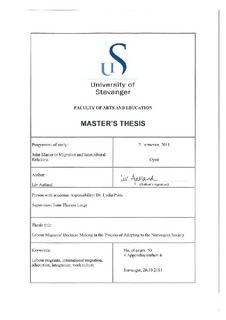Labour migrants' decision making in the process of adapting to the Norwegian society
Master thesis
Permanent lenke
http://hdl.handle.net/11250/185715Utgivelsesdato
2011Metadata
Vis full innførselSamlinger
- Studentoppgaver (HF-IGIS) [1070]
Sammendrag
The principal aim of this thesis is to uncover what factors contribute to labour migrants’
decisions of settling, or not settling, in their new country, and reveal what factors influence
positively or negatively to the adaptation process in their host environment. It involves all
the three levels of micro, meso and macro, however, it is particularly concerned with the
work environment and the individual’s decision making process. Young Yun Kim’s theory on
cross-cultural adaptation has served as a basis for this research, and it is carried out in the
Stavanger area, interviewing labour migrants in both the high skill and low skill sectors.
The findings indicate that age/generation, personality, and the search for fulfilling careers
are some factors that contribute negatively or positively to the decision of settling/living
long term in the country. Moreover, personal interests such as sport and outdoor life may
contribute to a positive adaptation process, as well as an ability to establish and maintain a
personal network. This is where the international community in Stavanger plays an
important role, serving both as a buffer between the migrant and the Norwegian society,
and providing important support functions for newly arrived as well as for foreigners that
have lived in Stavanger a while.
Keeping in mind the nation’s continuous need for foreign workers in the future, this research
may contribute to a better understanding of the interplay between the migrant, the work
environment and the society, and can thereby be a resource in facilitating for migrant
workers settling long term in the country.
Beskrivelse
Master's thesis in Migration and intercultural relations
